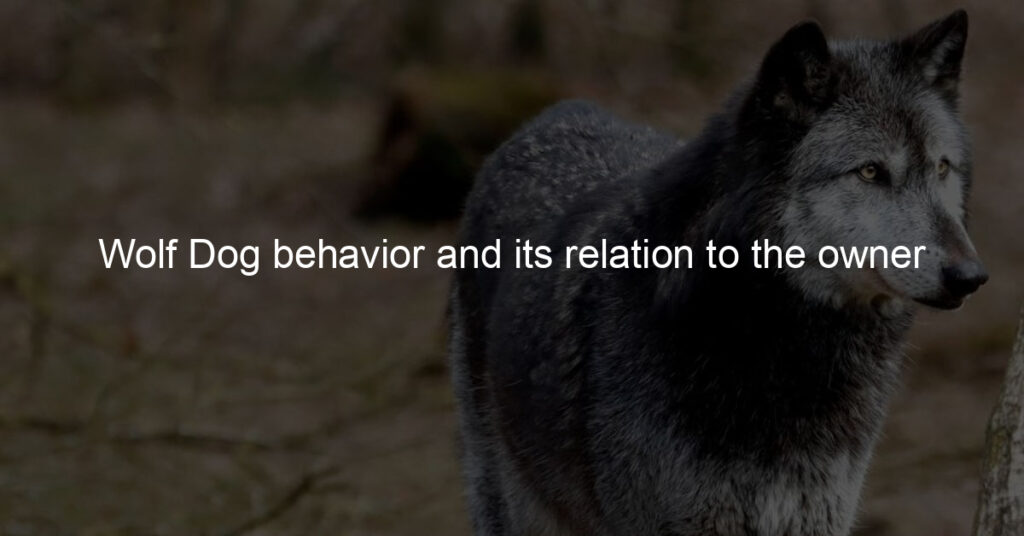Do you own a wolf dog or are interested in getting one? If so, then this post is for you! Buried beneath the fur and teeth of your beloved companion lies an incredibly intelligent being that’s capable of forming strong bonds with its owners. As such, understanding just how these animals think can make all the difference when it comes to successful ownership.
In this blog post, we’ll be taking a look at why wolf dogs behave the way they do and how that behavior relates to their owner. We’ll also explore important tips on how to better understand and interact with your pet to create a strong bond built on mutual respect. So if you’re a fan of wolves, and wild animals or simply want to learn more about training a new pet, be sure to keep reading!
Are wolf dogs protective of their owners?
Wolf dogs are a unique breed of canines that offer multiple benefits to their owners, and one of the key traits they possess is protectiveness. Wolf dogs have been bred to have high levels of loyalty and devotion, which in turn makes them particularly adept at being protective.
While it might not be true for every pack or individual wolf-dog, many will guard their owners’ homes or persons with fierce determination and commitment. Plus, due to the hybrid genetic makeup of wolf dogs, they often display natural guarding abilities even when not specifically trained for the task – making them a great option if you need an extra layer of security in your life!
Are wolf dogs loyal to humans?
Wolf dogs have the temperament of both wolves and dogs, which can make it difficult to predict their reactions around humans. Some wolf dogs will form strong bonds with their owners and show signs of loyalty over time, while others may display more skittish behaviors due to their wilder instincts. Rarely, a wolf-dog might even be aggressive or hostile towards people or other animals.
Since wolf dogs have unique needs based on their unique natures and genetic makeup, potential owners should research breeds carefully before committing to caring for a wolf-dog in the long term. That way, understanding and providing for those needs can result in a trusting and loyal relationship between the canine and its owner.
How do wolf dogs show affection?
Wolf dogs are hybrid canines, bred from both wolves and domestic dogs. They make wonderful and loyal companions but they show affection in ways that differ slightly from domesticated pets.
Wolf dogs convey love through body contact like licking, soft snuggling, and putting their head on your lap. Though they don’t bark or stare into your eyes like some other pooches will do, wolf dogs sure know how to make you feel loved with their special brand of cuddles.
They are extremely expressive and tend to be much more vocal than a typical dog; wolf dogs often communicate through haunting howls or guttural chuffs. Of course, this varies from one animal to the next but it never fails to remind us of their wild roots!
Do wolves love their owners?
With their intelligence and powerful sense of loyalty, it’s not hard to imagine wolves having the capacity to love their owners. Many owners claim that they have formed unique bonds with their wolves, resulting in deep mutual understanding and affection. While wolves ultimately cannot tell us what they feel, some experts believe that wolves do possess the capability to form close relationships with humans just like many other animals do.
To get a sense of how much a wolf may respond to its owner, consider observing how excited a wolf will become when around them as well as how willingly it may take commands. Ultimately, there may never be a definitive answer on this topic, but understanding wolf behavior is an important part of being an effective owner.
Summary: Wolf Dog behavior and its relation to the owner
All in all, wolf dogs have complex personalities, resulting from the combination of different breeds in their DNA. While wolf dog owners must be prepared for some unpredictability due to the wild nature of their pets, understanding wolf dog behavior is essential for anyone looking to build strong bonds with them. Training and trust-building measures should start from puppyhood and continue throughout adulthood.
Most importantly, it is important to remember the understanding and patience necessary when caring for any type of pet – especially a sensitive and intelligent canine hybrid such as the wolf-dog. By providing exercise, mental stimulation, affection, and structure – alongside consistency – owners can ensure that their furry friend is healthy and happy both physically and mentally!








